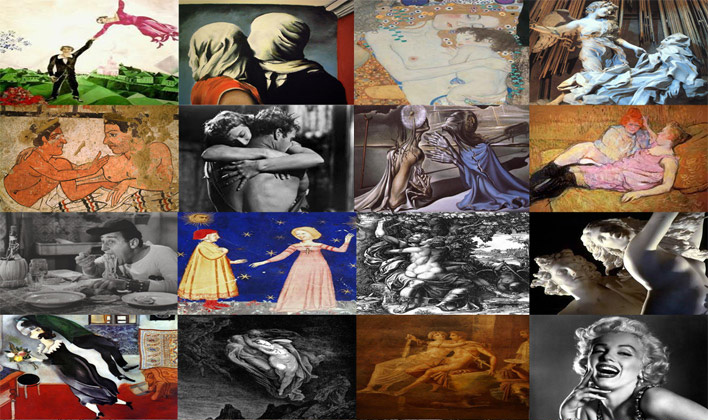The Kitsch desire: Walter Siti and his "too many paradises"
Abstract
Kitsch is the system where people live their lives as a commercial and their identity as an eternal performance. What happens there to desire? If in this utopia the man is supposed to live easily and pleasingly, how can he bear something out-of-hand such as desire?
After a theoretical introduction on Kitsch, the paper will answer these questions basing on three Walter Siti’s works: the novels Troppi paradisi and Autopsia dell’ossessione and the narrative reportage Il canto del diavolo. Here the reader finds three paradigms of Kitsch experience: tourism, television, and a certain kind of prostitution. By investigating them, the paper will show how the desire changes its shape when it has to face the Kitschmensch’s tendency to disguise himself «dans le miroir du mensonge embellissant et de s’y reconnaître avec une satisfaction émue», as Kundera says.
The marvellous and most sustainable lightness of being is then the Kitsch utopia cipher; it cannot consider the presence of desire but when it is feasible: the Kitsch desire, the ersatz of desire, is given for free with the product fulfilling it.
Downloads
References
Adorno, Theodor W., Minima Moralia, Torino, Einaudi, 2005.
Augé, Marc, Le temps en ruines, Paris, Galilée, 2003.
Baudrillard, Jean, La société de consommation, Paris, Denoël, 1970.
Baudrillard, Jean, Le système des objets, Paris, Gallimard, «Tel», 1968.
Bauman, Zygmunt, Il disagio della postmodernità, Milano, Mondadori, 2007.
Bedient, Calvin, “On Milan Kundera”, The new Salmagundi Reader, Eds. Robert Boyers, Peggy Boyers, Syracuse University Press, 1996: 232-48.
Benjamin, Walter, “Dream Kitsch”, Selected Writings 1927-1930, II-1, Cambridge, Harvard University Press, 2005: 3-5.
Benjamin, Walter, “Esperienza e povertà”, Metaphorein, I-3 (1978): 12-16.
Bourdieu, Pierre, La distinction. Critique sociale du jugement, Paris, Minuit, 1979.
Broch, Hermann, Il Kitsch, Torino, Einaudi, 1990.
De Certeau, Michel, L’invention du quotidien. 1. Arts de faire, Paris, Gallimard, «Folio», 1990.
Eco, Umberto, “La struttura del cattivo gusto”, Apocalittici e Integrati, Milano, Bompiani, 2008.
Flaubert, Gustave, “Le Dictionnaire des idées reçues”, Bouvard et Pécuchet, Paris, Gallimard, «Folio Classique», 1999.
Franzini, Elio, (ed.), Gusto e disgusto, Segrate, Nike, 2000.
Giesz, Ludwig, “L’uomo Kitsch come turista”, Il Kitsch. Antologia del cattivo gusto, Ed. Gillo Dorfles, Milano, Mazzotta, 1968: 197-218.
Greenberg, Clement, “Avant-Garde and Kitsch”, Art Theory and Criticism, Ed. Sally Everett, Jefferson N.C., McFarland, 1991: 26-40.
Kundera, Milan, L’art du roman, Paris, Gallimard, 1986.
Kundera, Milan, L’insoutenable légèreté de l’être, Paris, Gallimard, «Du monde entier», 1987.
Le Grand, Eva, Kundera ou la mémoire du désir, Montréal, XYZ éditeur; Paris, L’Harmattan, 1995.
Longo, Francesco, “Walter Siti a Dubai, pregiudizi pasoliniani”, Il Riformista, 29.04.2009.
MacDonald, Dwight, Masscult and Midcult, Essays against the American grain, New York, NYRB, 2011.
Menninghaus, Winfried, “On the ‘Vital Significance’ of Kitsch: Walter Benjamin’s Politics of ‘Bad Taste’”, Walter Benjamin and the Architecture of Modernity, Eds. Andrew Benjamin, Charles Rice, Prahan, Vic., re-press, 2009: 39-57.
Merlino, Giuseppe, Viaggi di carta e d’inchiostro. Dal mito al tour, Camigliatello Silano, Quaderni del Parco Old Calabria, 2002.
Moles, Abraham, Le Kitsch. L’art du bonheur, Paris, Mame, 1971.
Orlando, Francesco, Gli oggetti desueti nelle immagini della letteratura, Torino, Einaudi, 1993.
Recalcati, Massimo, Ritratti del desiderio, Milano, Raffaello Cortina Editore, 2012.
Siti, Walter, Autopsia dell’ossessione, Milano, Mondadori, 2010.
Siti, Walter, Il canto del diavolo, Milano, Rizzoli, 2009.
Siti, Walter, Troppi paradisi, Torino, Einaudi, 2008.
Veblen, Thorstein Bunde, The Theory of Leisure Class, New York, Penguin, 1994.
Wawrzycka, Jolanta, “Betrayal as a Flight from Kitsch”, Milan Kundera and the Art of Fiction: Critical Essays, Ed. Aron Aji, New York, Garland, 1992: 267-80.
Copyright Notice
You are free to copy, distribute and transmit the work, and to adapt the work. You must attribute the work in the manner specified by the author or licensor (but not in any way that suggests that they endorse you or your use of the work).









